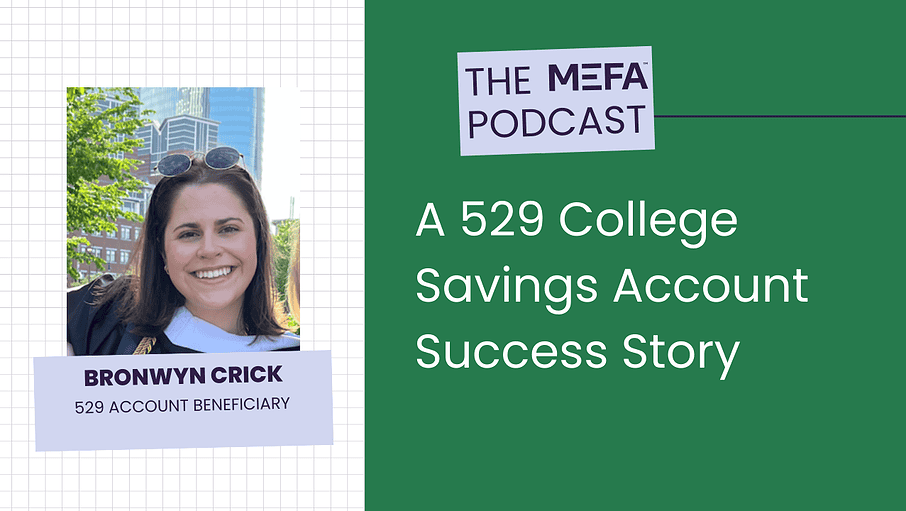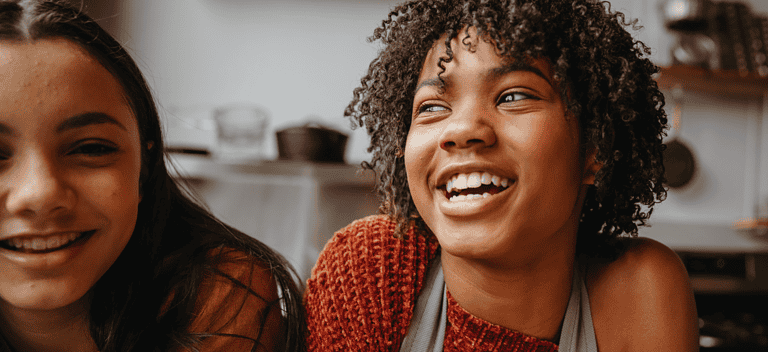

Resources Mentioned in the Episode:
Bronwyn Crick: [00:00:00] I take for granted the fact that I was openly talking to my parents about things. I remember when I was in elementary school, I told everybody I wanted to be the president of the United States, and then that kind of shifted when I got in fifth grade and I wanted to be a lawyer, which is still my aspiration to this day.
So I, I had always known that Education in college was something that I was going to do and my parents were supportive, but we didn’t talk about the financial side really until I got to college and I am very lucky that my parents had thought ahead when I was younger to start saving. Cause that’s what I think those conversations would have been really different.
Jonathan Hughes: Hi folks and welcome to the MEFA Podcast. My name is Jonathan Hughes and you just heard from our guest on the show today. Now I don’t want to say too much about what she’s going to talk about on the show, You’d rather hear her, but her own personal story is a great illustration of a point that we make all the time about college savings, and that is starting to save [00:01:00] early and saving often, even if it’s a small amount, makes a big difference.
Now it’s easy for the parents of young children to look at the cost of college that Are the subject of news stories and think there’s no way I can save that so why try it better Just hope for a scholarship, and I understand that you know I’ve had those thoughts myself but What you’re going to hear from our guests on the show today points towards a better path one that takes advantage of the benefits of a dedicated college savings account the 529 plan and College planning and scholarship searches and applications.
So when I heard her tell the story in a zoom meeting, I said, I have to have her on the podcast. So please enjoy meeting our guests and hearing her college saving success story. And I’ll be back afterward to wrap things up.
Bronwyn Crick: Hi, I’m Bronwyn Crick. I’m originally from a small town in western Colorado called Eagle.
I was born and raised there, went to high school there. I decided [00:02:00] to come to Boston to pursue my education. I did my undergraduate degree at Suffolk University. I studied politics, philosophy, and economics. And then decided to add on one additional year to complete my master’s degree. My master’s degree is in global public policy.
I’m super excited. I’m really excited to be here. I am very excited to, to talk about child savings and college savings.
Jonathan Hughes: Yeah, let’s talk about that. First of all, let’s talk about how we met.
Bronwyn Crick: Yeah, of course. Part of my graduate program required me to complete an internship. I wanted to do an internship that had to do with the more economic side of my degree.
While my master’s degree focuses on global policies, I respect the fact that global policies really start domestically and start locally. And I had great respect for what I call like economic equality and economic Empowerment, which is how I ended up finding OEE, which is the Office of Economic Empowerment here in Massachusetts.
I was the Baby Steps intern. So Baby Steps is a really cool program in [00:03:00] Massachusetts that has qualified families with children under the age of one born in Massachusetts who get 50 into their 529 savings account. It just seeds their college education and saving for the future. I don’t know how much we want to go into it right now, but it’s really a key basis of making sure that there’s an equitable education future for children in Massachusetts.
Jonathan Hughes: And that sort of dovetails into why you specifically are on the show, because you have a great story. From your own life about the five to nine moments. I wonder if you could tell it.
Bronwyn Crick: Yeah. So the reason why I was drawn into baby steps, I shared in my interview when I was interviewing to be an intern.
But I’m super passionate about college savings and that comes from a place of my own background. I was really lucky. My entire college education was paid for by my five to nine. Again, with the assistance of many scholarships. and things like that. But the main vehicle for my college tuition was my 529 account.
My dad opened that the [00:04:00] day after I was born. And so that really funded my education and it made it a lot easier. And I had a lot more opportunities because of that savings.
Jonathan Hughes: And you said it was it your brother as well?
Bronwyn Crick: Yeah. Yeah. My brother’s also a five to nine kid. So he’s currently, so I’m here on the East coast.
My brother actually goes to school at the university of Utah in Utah and he’s studying film and media studies.
Jonathan Hughes: And so you had your entire undergraduate and graduate paid for by 529s and financial aid and scholarships.
Bronwyn Crick: Yeah. That was how I paid for my education. I was really lucky.
I worked really hard in high school and focused really on the benefits of financial aid as well as my dad from a very young age has incentivized me to save and save for college and education. Because to him, that was something that was super important.
Jonathan Hughes: Yeah. I was going to ask you about that later, but now that you mentioned it I’ll bring that up.
Is that something that [00:05:00] I guess it is. But if you could talk about, how that was treated in your house growing up. And then also my question after that is, didn’t you tell me it was a relatively small amount that was being saved right for you every month? Is that it?
Bronwyn Crick: Yeah, it’s my understanding.
My dad told me it was 10 a month from the time that I was born. When he had financial ability, he would put a little bit more in. But that really was just like a small deposits monthly for both me and my brother. And I will say like the really important thing that I’ve learned is like where I grew up.
It’s a really rural town. I grew up in a ski resort town in Colorado. So the opportunities to go to college looks very different. So I have friends who went to trade school. Four year university was never, taught to me in my like academic areas of my life as the only way forward.
And, something that was really nice about my 529 account was that it’s any educational cost. Anything from trade school to tuition to room and board, all of those educational costs are [00:06:00] qualified. So if I had decided I wanted to go to trade school, which was not something that I was considering, but I knew my friends were then that would have also applied, but.
I will say in my household, my dad is an immigrant, my dad is from the UK, he didn’t go to college and didn’t have a college education, but my mom went to Simmons here in Boston and so she had a college education, so I was always told there were multiple opportunities, and I had the choice of where to go whether that be a four year university, which is something that I was super passionate about, and something that I wanted to pursue I love studying.
Now that I’m wrapping up my master’s degree, I’m like, Oh, I’m just taking notes and things like that, which is just who I am. But I was told that I had options and it wasn’t always a four year college, but that was something that I ended up choosing for myself as I got into my education in high school.
Jonathan Hughes: How young were you aware of the savings? Is this something that you always knew that there was this money being put aside for you?
Bronwyn Crick: Yeah, that’s a good question. [00:07:00] I take for granted the fact that I was openly talking to my parents about things. I remember when I was in elementary school, I told everybody I wanted to be the president of the United States.
And then that kind of shifted when I got in fifth grade and I wanted to be a lawyer, which is still my aspiration to this day. So I, I had always known that like education in college was something that I was going to do. My parents were supportive, but we didn’t talk about the financial side really until I got to college.
And I am very lucky that my parents had thought ahead when I was younger to start saving. Cause that’s what I think those conversations would have been really different. Being a lawyer and working in those realms is a lot of school and school is expensive. And so I’m really lucky that my parents were able to have those conversations with me.
And then I remember as I got into the later years of my college, specifically junior, senior year of high school, money did become a conversation that we talked about. And I think something that was really important to my parents when we were having those discussions was making sure that I understood the reality of what it [00:08:00] means to be going to college and spending.
Money on education because it is they’re big price tags. I went to a private university and that’s a really hefty tag. I chose not to go to school out of state school in Colorado so having conversations about what that looks like what I had in my savings What I needed in terms of financial aid and then what I needed in terms of scholarships in order to Really successfully complete my four years at Suffolk with as little debt as I possibly could.
Jonathan Hughes: So that was what I was wondering really did you start off with that savings and go okay?
This is what I would need and then try to find that through scholarships Did you apply for a lot of it sounds like you did do that and then did you find a lot of outside? Scholarships was a primarily scholarships from the college. How did that go?
Bronwyn Crick: Yeah, so Every I feel like every senior in high school has like the oh my gosh I have to like really think about what I’m going to do.
There’s At least where I grew up, we had like scholarship week where we got to hear from [00:09:00] local businesses who sponsored people. So I was really lucky. The Vail Board of Realtors, which is a real estate kind of agency in my hometown had a scholarship that I applied for that I got granted my second year of school, which helped my financial costs and burden Suffolk university also gave me a massive financial aid package.
So when I was. looking at schools and looking at where I wanted to go, I said, okay, this is what I have saved. How much is going to ultimately come out of my own pocket or my savings with how much they’re giving me. So I had some schools that gave me very small things. Like I remember one of the schools gave me a thousand dollars a semester, which was, Nothing comparisons of this school costs $90,000 a year.
$1,000 maybe covers my books for two semesters. Looking at what schools were offering and then, what local businesses were willing to support as well, on top of what I already had saved was also really important for me. And I made spreadsheets. My [00:10:00] dad actually helped me make a spreadsheet in Excel with What I had in my savings account, my like five to nine savings, what schools had offered me, what the real cost was, and then also being who he is.
And he had another column like cost estimated cost of living where I was going. So I looked at going to school in Texas and the cost of living in Texas was very different to living here in Boston. And I remember my second year of college, like my second year of high school, I was like, my second semester of high school, I thought to myself, I was like, oh my gosh, I have like, all these different offers and I have all this information, now I just have to decide what’s best for me.
Jonathan Hughes: Yeah, that is impressively analytical but it is a lot to go through and to decide.
Bronwyn Crick: Yeah, definitely. And It’s hard if you think that you’re like the only one making those decisions, I don’t think it’s normalized to talk about, why you choose a school and, a lot of people are like, Oh, it’s the culture.
It’s the people. And I think that’s really important. I worked in [00:11:00] orientation and in at Suffolk, I think culture and people are really important, but also, financial aspects are something that people are going to have to consider. And I think it’s important to normalize that conversation in communities and be like, How can we better prepare ourselves to go forward?
Jonathan Hughes: Now I’m wondering about the graduate school piece of this. Was this something that you were thinking about when you went into undergraduate school as well? Did you know graduates? No, you didn’t.
Bronwyn Crick: Yeah, no. At first when I came in as a freshman, I thought my path was very clear. I thought I was going to have four years at Suffolk, and then I was going to go to law school immediately after, which is three years.
And I, that was in my head, my best course of action. But as I got into my senior year of college and I was, my, my college experience had looked very different because of COVID and things had changed and I had some amazing professors and faculty at my school who really sat down and had the conversation with me.
It was like, how are you best going to [00:12:00] progress your career forward? And what’s the best path? And that maybe is different than the path that you had thought of. And I remember I had a conversation with a professor. I had been offered an opportunity to apply for the master’s program at Suffolk.
And she said to me, she said, look at what all the options you have. You are 22 years old. You have plenty of options and you have plenty of interests. And then I got an email from Suffolk being like, we really highly encourage you to apply for our graduate program. It’s a one year graduate program.
It’s in global public policy. And I was talking to some family members and my uncle said to me, he said, what’s the harm? He’s this is something you’re passionate about. This is something that you want to do. And overall, it’s going to benefit your future career. And I was like, you’re right. And I was like, Oh, but then also grad school is really expensive.
Like I’ve heard all these horror stories. And my parents were like you still have money in your college savings. That’s not depleted yet. Like [00:13:00] you still have that money. And yeah, you were talking about saving it for law school, but this is an opportunity that’s presenting itself that you’re excited about.
And I was like, yeah, okay, might as well. So I applied, got into the program. And then I also applied for a fellowship, which is like a scholarship. On campus with orientation, which was an office that I was already involved with and very passionate about. And that basically made it so that my entire graduate master’s degree was covered by financial aid, my fellowship, and the money that I had saved.
So I, it was, it just worked out.
Jonathan Hughes: I understand that you have plans for your remaining funds in your 500 as well, right?
Bronwyn Crick: Yeah. So I had at the end of my graduate school experience, I had maybe 10 or 15 left in that account, but I was like currently planning on going to law school in the future, but I think my savings for that is going to look very different.
Just based off of my personal, where I can [00:14:00] put money into, but but I also had a very good family friend who’s worked with my parents and he works in finance and he was like, I tell all my children, the next important step in your life after law school. College is retirement, and that’s something that people are starting to have to plan for a lot younger and it’s really cool.
There’s like a new policy that I know we’ve talked about, which is that you can roll your 529 over into a Roth IRA account. And something he said to me was very similar to what we say about college savings accounts, which is he’s it can be 5. a month into this, and that’s towards your future retirement.
And he did the math for me, and he was like, if you retire when you’re 60, you’ll, if you do 10 a month for the next, 40 years of your life, you’ll have a million dollars. And I was like, that’s crazy to think about. That’s so insane, because I know I’ll probably work past 60 years old, but also just [00:15:00] knowing that’s the next big thing I’m saving for as a young person is also really cool that I didn’t have to open a different account and figure all that out.
So it is really cool.
Jonathan Hughes: Is there any other piece of advice or anything you’d like to leave anybody with who, is maybe has a young child and Thinking about putting some money away for a college and not sure if they can afford it or they might be daunted by the high cost of college now and thinking, I can only save a few dollars.
So what’s the point? Or just any piece of advice that you would give to anybody in this process?
Bronwyn Crick: Yeah. I mean for me I’m always so grateful for my parents. My dad is a ski instructor. I don’t know if I didn’t lead with that, but my dad is a ski instructor. My mom works in banking now, at the time that I was born, my mom worked for the resort and so did my dad.
And, That’s not, that’s a really fun career. It’s ski bum, that kind of culture. But most of my friends, parents had the same [00:16:00] attitude. And I think it came from a culture of working hard for something that you care about. And, part of that is 5 is a lot more than, you don’t, it’s a lot more than you don’t currently have.
If you look at it that way, 5 is, a part of a book or You know anything it’s part of materials that you need for your nursing classes or something like that So I think looking at it as a seed, you know We talk about seeds a lot in child savings account to grow a tree and this tree could have multi Branches so you can have you know Your college, you can have your retirement, you have your, where you live while you’re studying, things like that is all part of that educational future.
That’s really important. So I guess the advice I would give is, even the smallest little bit could be life changing for your future education or for your future retirement or for your training, I have seen my friends do [00:17:00] amazing things with training programs, with apprenticeships, and I hope to see myself do great things as I continue on my passwords education.
But all of that comes from the fact that our parents just saved a little bit, just 23 years ago. That’s my advice.
Jonathan Hughes: Bronwyn, thank you so much for being here. I really appreciate it.
Bronwyn Crick: Thank you, Jonathan. I’m happy to be here.
Jonathan Hughes: All right. Didn’t I tell you what a pleasure it was to have Bronwyn on the show and to hear her story? So I’d certainly like to thank her for being willing to come on the show and share that story with us. And folks, if you liked what you heard today and you want to hear more from us on planning, saving, and paying for college and career readiness then you can follow the show, and of course you can do that wherever you find it.
your podcast. Oh, and please [00:18:00] rate and review us because it helps us to keep doing the show. I’d like to thank Shaun Connolly, our producer. I’d like to thank AJ Yee, Lauren Danz and Lisa Rooney and Meredith Clement for their assistance in getting the show posted. Until next time, my name is Jonathan Hughes and this has been the MEFA Podcast. Thanks.










